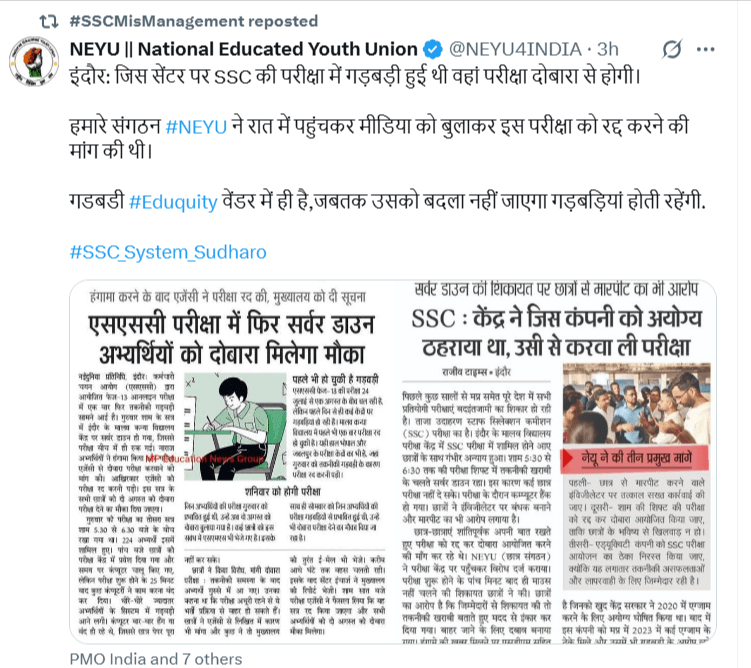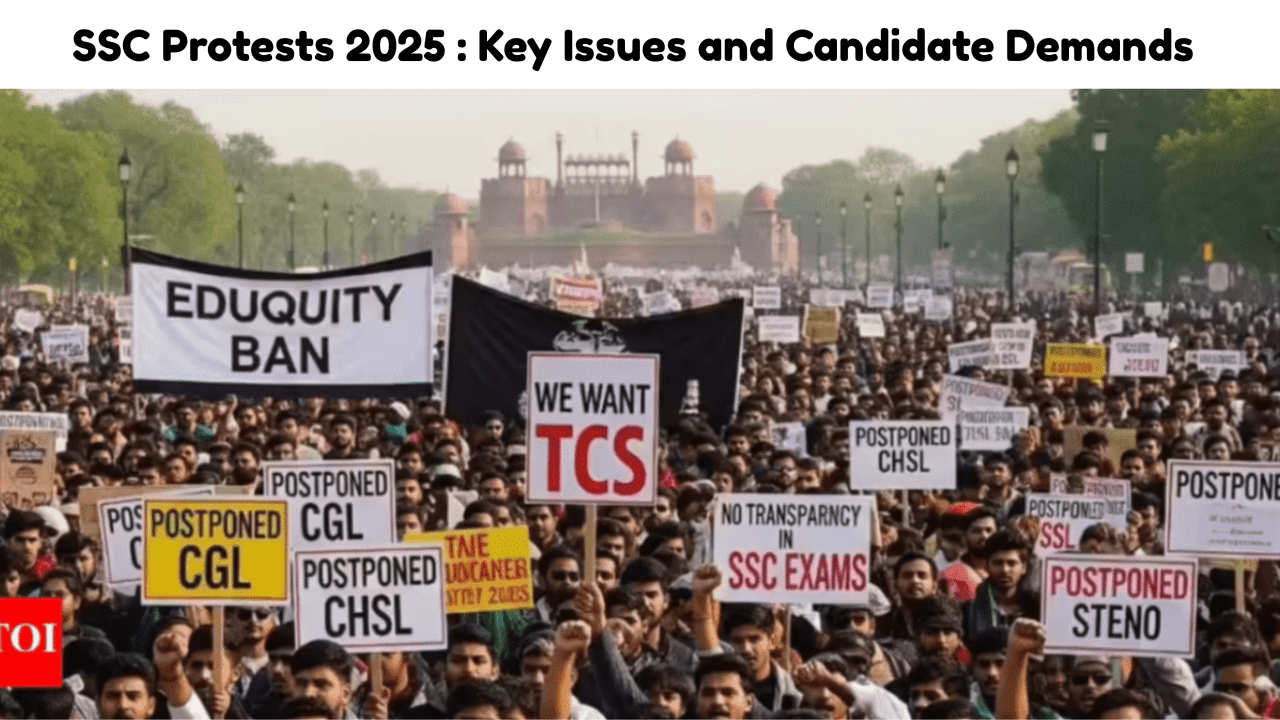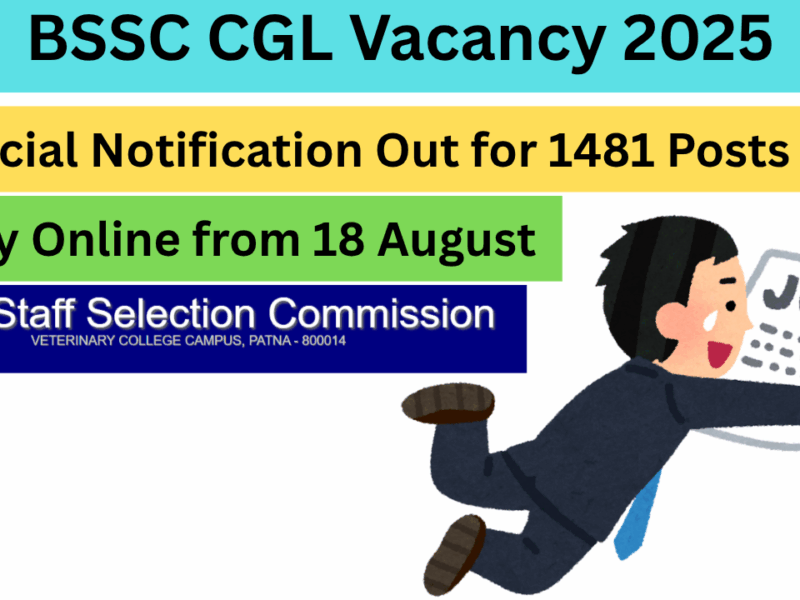Recently, the Staff Selection Commission (SSC) has come under the intense glare of a plethora of aggrieved aspirants across the nation with allegations ranging from exam mismanagement and last-minute cancellations to widespread technical glitches. The outbreak of protests, both online and on-ground, was spurred after initial sporadic complaints of the SSC Selection Post Phase 13 exams. What could have been just an isolated incident has now turned into a national matter, where thousands of students are demanding at least the accountability of transparency and perhaps a complete restructuring of the examination system. Under the trending banner of #SSCMisManagement, students state that the broken and unresponsive system is jeopardizing their careers and years of preparation.
This article will examine the saltwater sources causing the bulk of the erstwhile outrage, individual instances that triggered the protests, and what students and educators are now demanding from authorities. We shall then look at the deeper systemic defects in SSC’s functioning and what reforms would need to be implemented to build back trust among millions of government job aspirants.
What Triggered the Current SSC Protests?
The fresh wind of protest from SSC aspirants is stirred around a collection of poorly handled situations during the schedule of the Selection Post Phase 13 Exam held between July 24 and August 01, 2025. A supposedly routine examination cycle went through chaos and became a discouraging experience for thousands of candidates across India. Here’s a breakdown of what triggered this national outcry:
1. Selection Post Phase 13 Exam Mismanagement
This exam was undertaken to recruit members of various central government departments across India, attracting lakhs of applicants.
Instead of a smooth conduct, it witnessed incidents of:
- Poor coordination between SSC and the exam centers
- Irregular scheduling (some exams began late, some were cancelled altogether)
- Irregular protocols across various centers
2. Sudden Cancellations and Center-Level Confusion
- There had been cancellations of appointments at quite a few centers without any prior notice, leaving students running around.
- Students had come from far away, had booked accommodation, and had given commitment of time and money; only to be told upon arrival at the center that their test had been called off or rescheduled.
- Conflicting instructions were given at a few centers, setting stage for mass disqualification or outright chaos.
- Those instances when candidates were let in and then told the system wasn’t going to work are especially quite distressing.
- In some centers, candidates were refused the opportunity to appear on grounds of “technical” or “administrative errors,” despite holding valid admit cards.
3. Technical Failures: Software Glitches & Biometric Errors
Technical issues shadowed the proceedings with reports of many such incidents:
- The software crashed; terminals became unresponsive and forced examination sessions to be either paused or blocked from continuing.
- Biometric systems went awry, resulting in identity verification errors and further delays.
- Input devices such as keyboards and mice were malfunctioning, thereby affecting candidates’ ability to complete their papers.
Some centers were reportedly without backup power and faced power outages mid-exam.
Eduquity Career Technologies, the newly contracted exam vendor, has come under severe scrutiny for its continued failure to operate at scaling capability.
4. Viral Incidents and Candidate Testimonies
Videos and social-media posts by student victims of the center went viral:
- One showed a candidate being pulled out forcibly after questioning the staff.
- Another showed students sitting in the middle of a road outside a center and waiting for clarification hours past their scheduled slot.
- Students took to platforms like X (formerly Twitter), YouTube, and Reddit to share their tales, using hashtags like #SSCMisManagement and #SSCHarassment.
Eyewitness Accounts Described:
- Verbal abuse by the exam staff
- Giving wrong information about test timings and room allocations
- Overcrowded, badly ventilated rooms with no arrangements for sitting or water to be served
Major Issues Highlighted by Aspirants
The current protests are not just about one botched exam. The unrest has been growing for years among SSC aspirants frustrated and outraged, feeling ignored for mishandling and misleading them into a system that does not even set a basic standard of fairness and transparency. Below are the key problems raised loudly and consistently by the candidates:
1. Unreliable Exam Vendors (e.g., Eduquity Career Technologies)
The recent chaos in the Selection Post Phase 13 exam exposed the incompetence of Eduquity, the private vendor …hired to manage the exam logistics.
Problems cited:
- Poor maintenance of infrastructure at the exam centers
- Frequent technical failures (system crashes, system failures)
- Staff who are unaware of exam protocols and how to treat candidates
- Candidates question how vendors are chosen and if they are sufficiently vetted in case of national-level recruitment exams.
- SSC has been accused of outsourcing to cheap and low-quality service providers, without any mechanism to punish its nonperformance.
2. No Grievance Redressal or Accountability
CCandidates allege that there exists virtually no responsive channel wherein they can raise issues or appeal against decisions once the issues occur-whether technical or administrative.
The official SSC helpdesk and grievance portals are either:
- Non functioning
- Overloaded with follow up
- Redirect candidates in loops without a resolution
SSC has never, not even in the slightest way, apologized formally after 55,000+ complaints, as per recent reports.
Students describe themselves as feeling “invisible” in the system supposed to serve them.
3. Poor Exam Logistics: Center Allocation and Staff Misbehavior
Many of the candidates were allotted centers hundreds of kilometers away using preference data filed during application.
In some cases, admit cards were issued late or at the last moment, the exam center names were changed.
At multiple centers hundreds of kilometers away, the invigilators were:
- Rude and untrained
- Denied entry to bona fide candidates on flimsy grounds
- Uncooperative in the event of a technical breakdown
Videos have emerged showing candidates being verbally abused or ordered out without explanation, further traumatizing those affected.
4. Lack of Transparency in Results and Normalization
Candidates often complain that SSC remains silent on how normalization is carried out when shifts differ—especially when technical faults interfere with performance.
Result publications usually:
- Come with no detailed explanation or individual score cards at once
- Have no logic publication of cut-offs or justification-based answer keys.
- Many aspirants believe the procedure for giving scores is opaque, and even the final merit list is unclear.
5. Result Irregularities (e.g., CGL 2024 Controversy)
The SSC CGL 2024 results were embroiled in controversy for the following reasons:
- Alleged cheating with suspicious patterns involving roll numbers in top ranks
- Cut-offs that were inexplicably high due to normalization, even for candidates appearing in their easier shifts.
- The calls for the Chairman’s resignation arose because of the SSC’s refusal to address the grievances.
- Candidates felt that if CGL—the commission’s flagship exam—is subjected to such mishandling, no examination can be free of malpractices or errors.
Student Demands From SSC
The demands placed by the SSC aspirants are very clear and actionable. They are demands raised not only against the recent mismanagement but also to push for longer-term reforms.” Demands for fairness, transparency, and accountability have accumulated in the recruitment system. Here are the main points to which the students are uniting:
1. Independent Investigation of Exam Mismanagement
Students are demanding a fair inquiry into the mismanagement of the Selection Post Phase 13 exam, including the last-minute cancellation, technical breakdowns, and alleged staff misconduct, with a view to holding the guilty parties accountable.
2. Blocking of Contract of Eduquity
Candidates want the contract of Eduquity Career Technologies to be terminated immediately, holding the vendor responsible for major logistical and technical failures. They want further vendors to be selected through a transparent and competitive process.
3. Creation of Reserve/Waiting Lists
Aspirants want SSC to create a waiting list whereby vacant posts vacated by candidates who do not join are filled by the next eligible candidate. This is represented to prevent seats from being lost and to benefit deserving candidates who just missed the cut-off.
4. Timely and Fair Conduct of Future Exams
The protesting candidates want the SSC to strictly follow the exam calendar and ensure the release of admit cards and results in time without any sudden diversion. They want the infrastructure to remain courteous technically so as to conduct the exam fairly without any glitches, at least this time.
5. Better Communication and Transparency from SSC
Communication improvement by SSC has been an evergreen demand ever made by the students for time immemorial. Students are asking for regular updates, timely announcements in case of any changes, and a grievance redressal mechanism that actually takes cognizance of complaints.
Reactions from Influencers and Educators
After the chaos at the hands of the SSC, an entire fraternity of teachers, coaching agents, and influencers who played a role in framing the narrative around competitive exams came forward with their reactions. Their voices merged to lend more voice to the students and provided more momentum to the protest movement.
Support from Coaching Institutes
Top coaching institutes, teachers like Neetu Singh, and several others have stood in support of the protesting candidates, condemning the laxity in examination management and demanding immediate reforms. Many institutes have taken it upon themselves to educate aspirants about their rights and the best way to lodge their grievances.
Social Media Mobilization (#SSCMisManagement)

Social media has become a powerful tool in spreading awareness about the SSC issues. Hashtags like #SSCMisManagement and #SSCHarassment have trended on platforms like Twitter, Instagram, and Facebook, uniting thousands of students across regions. Viral videos, testimonials, and real-time updates keep the pressure on authorities while building a strong online community demanding change.
Offline Protests: Jantar Mantar and “Delhi Chalo” Movement
On the aspect of offline protests, the aspirants have staged demonstrations at prominent grounds like Jantar Mantar in New Delhi. A few hundred students marched towards the national capital through the “Delhi Chalo” stir asking immediate action from government authorities. These protests symbolize the seriousness of the issue and the shared frustration among candidates who feel their futures to be in limbo.
Response from SSC and Authorities
The SSC and other government authorities had to be set into motion by the large-scale protests and public outcry. However, candidates feel that whether the actions have been adequate and sincere is still up for debate.
Has SSC Made a Public Statement?
Initially, the SSC released a few statements where they acknowledged the technical issues during the Selection Post Phase 13 examinations. They expressed regret about the inconvenience caused to candidates and assured about the steps for redressal. However, most aspirants thought vague and insufficient statements were released with no clear timelines or proper solutions.
Steps Taken (If Any)
In response to mounting pressure, SSC announced the following steps:
Student Reactions to These Responses
The response from SSC has been met with a strong suspicion and disappointment on the part of the candidates in protest. Many believe that the steps announced do not essentially provide an appropriate redress to the extent of mismanagement nor adequately deal with the systemic issues in SSC’s functioning.
What Needs to Change: Structural Reforms
Fixing the Vendor Selection Process
The SSC has to completely revamp its method for vendor selections, ensuring that only highly qualified and reliable entities deal with recruitment activities of utmost concern. These would comprise the following:
- Transparent bidding and evaluation
- Strict performance audits and penalties for failures
- Avoids awarding contracts to companies that provide inexpensive services of inferior quality, thereby putting the future of candidates at stake.
Management, SSC must:
- Provide an easy way for candidates to report issues;
- Track complaints and provide clear timelines for resolution; and
- Supply timely, transparent updates to build trust.
Implementing a Transparent Grievance System
Candidates deserve smooth customer service. Hence, candidates should be kept informed about a publicized grievance redressal mechanism that:
- Enables candidates to levy their complaints with ease
- Has a register of complaints and sets deadlines for resolution
- Keeps candidates informed of the latest developments so that confidence in the mechanism grows
Making SSC Accountable through Parliamentary or Legal Oversight
This way, SSC will avoid another episode of mismanagement by:
- Regular reviews and audits by parliamentary committees
- Legal action in the case of failures affecting a large candidate population, and
- Clear public reporting on the examination conduct and vendor performance.
Conclusion
At first, the SSC crisis was caused by isolated issues in exams but has snowballed into massive protests with demands for quick changes. Deep-rooted problems of mismanagement, technical failures, and lack of accountability severely affected youngsters and thousands of Florida-GFB aspirants’ futures.
Reforms that are timely and thorough must therefore be implemented not just to address acute issues but also to revive faith in the SSC as an honest and transparent recruitment body. In absence of such reforms, the trust of millions of candidates reliant on the SSC exams goes down the drain.
At the end of the day, aspirants’ voices are, in fact, the future of civil services and government workforce in India; hence, these voices cannot be ignored. Solving their issues with due sincerity and responsibility implies a much stronger and a fairer recruitment system.


